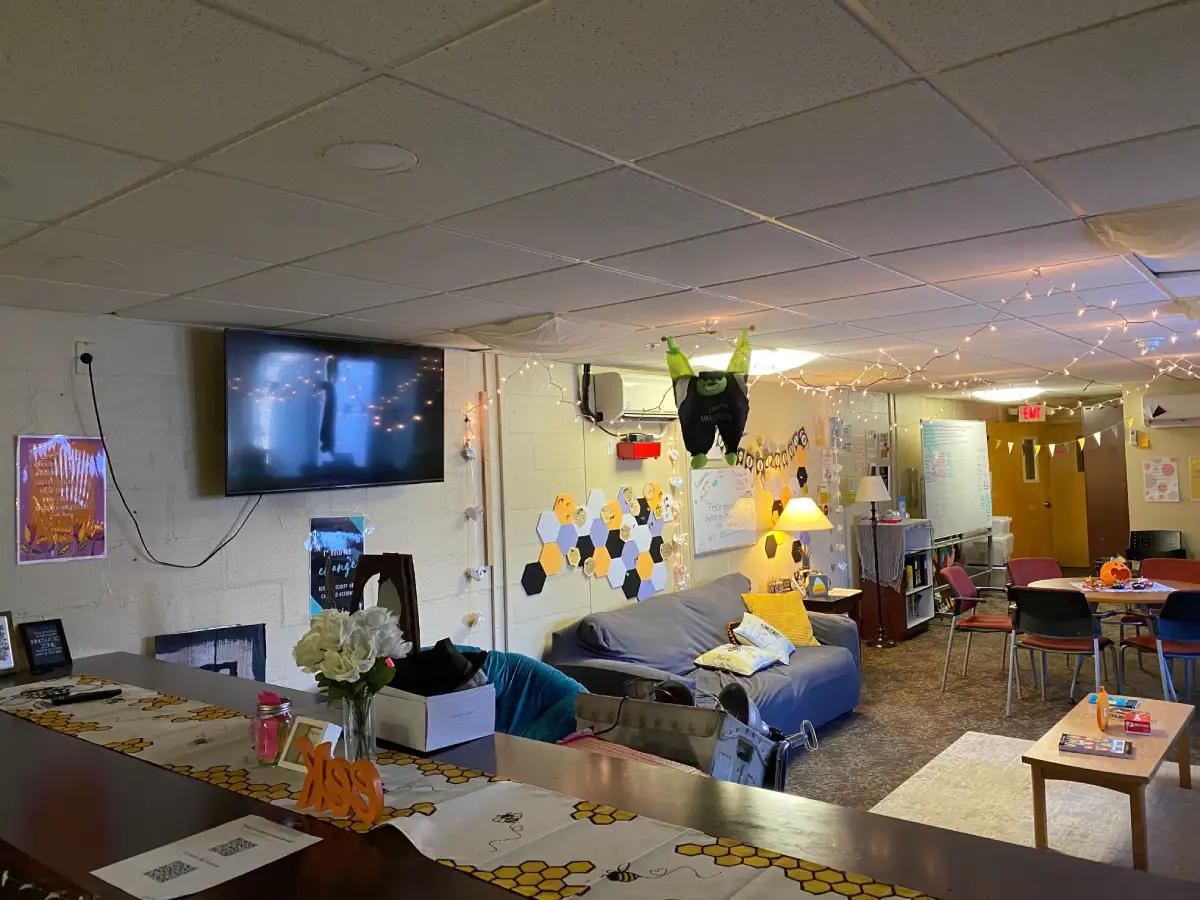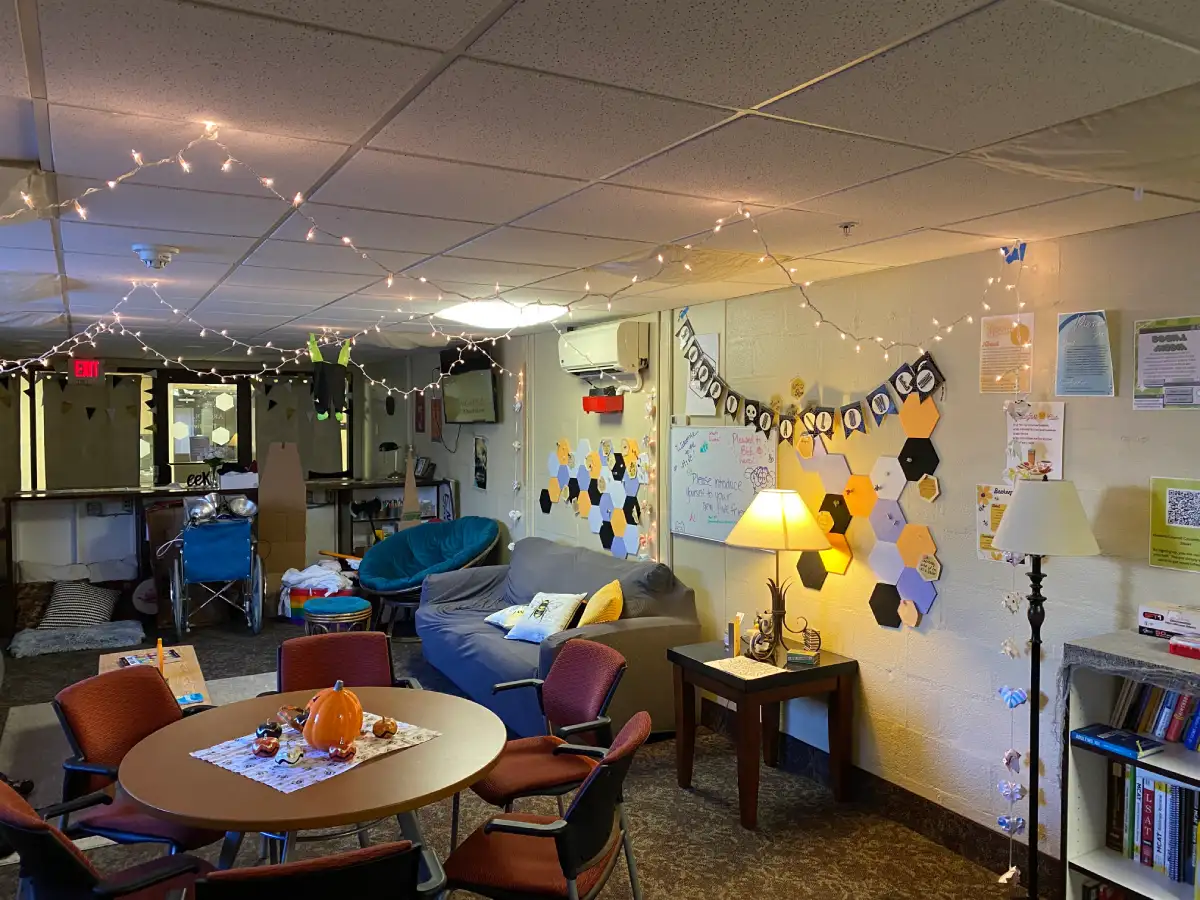The Honors “Hive” Moves to a More Accessible Location in the Dining Complex

This semester, the space dedicated to the Honors Program, named “The Hive,” has moved to a new, more accessible location between the Dining Hall and Dilworth Hall.
The Hive was previously contained on the second floor of Blankley Hall, and though it was a beloved space for those who could access it, its location kept some students from enjoying the shared space that was reserved for them.
“That’s really problematic,” said Helene Klein, assistant dean for Honors and Accelerated Programs. “We have had students who literally could not access a space that is promised to them as part of being in the Honors Program.”
Klein and the Honors Program had been searching for a place to move the Hive for some time, but other available locations offered their own sets of accessibility issues. Klein explained.
“I wasn’t going to trade off one accessibility issue for another one,” she said.
However, over the summer, the pieces began to fall into place and the Honors Program was offered the space right across from the Dining Hall, where the IT Help Desk used to be.
“The new Hive is like 97 percent more accessible than the old space,” said Klein. “There’s elevators in this building and easy ways to ingress and egress from the space, so we moved purely for accessibility reasons.”
Beyond the accessibility concerns, the Hive’s new location offers some other benefits for students in the program. Being right across from the Dining Hall, it is a much more centralized location on campus, making it even easier for students to stumble upon and spend time in.
Furthermore, Klein, Carole Loeffler, Honors assistant director and professor of Visual and Performing Arts, and the Honors students have worked to make their new space feel as homey as possible with comforting decorations, furniture, lighting, and a coffee bar. Loeffler even thrifted some rugs and brought her children in to help build the new stools to help warm up the space.

“The new Hive is in a more central location, which is fantastic,” said Loeffler. “While we no longer have the charm of the historic nooks and crannies of the old Hive, Helene and I worked hard to make it feel like a welcoming space. The best thing about the new Hive is that it is more accessible!”
“I feel like people are using it more than our old Hive,” Klein said. “Students can easily access it. They can easily come in and out of here even if they don’t eat in the dining hall, the mailroom is here, and it’s right across from the Commons.”
The Hive’s new location has also been well-received by students.
Jocelyn Royal ‘24, one of the presidents of the program, known as the “Powers That Bee” (PTB), said the change makes the room feel as if it’s more in the heart of campus instead of being tucked away.
“Previously, we kind of felt sequestered and hidden away, and while we’ve put up some curtains to feel less on display, I like being more centralized,” said Royal. “We also have some more room to work with for events.”
“I think that Helene has done a really, really incredible job of making the place maintain the magic it always had,” shared Justin Peccina ’24, another member of the PTB. “I stopped by once earlier in the semester, and it was just me and a few first years I had never met, and Helene took the time to introduce herself to us, we did the same for each other, and then actually asked us if we think the furniture should be moved around.”
“We spent about 5 minutes working with Helene to put together a couch set-up that would be best to create a comfortable space, and I thought that was really cool,” he added. “She’s always thinking about how to build community, and now she’s using the setup of the new Hive as a bonding experience.”
The final member of the PTB, Chloe Fox ’24 added that the transition itself went smoothly as well. “Facilities was a big help in getting everything moved over and set up for us,” she said. “As for the students, they have seemed to adapt very quickly as honors students always do.”
“I feel more incorporated in the community than when we were alone on the edge of campus,” Fox continued. “It also makes the Hive more accessible to everyone and closer for our first years living on campus. We have definitely noticed a lot of use this year and that could be in part due to the central location.”
As for the future of the Hive, the hope of the Honors Program is that ultimately more people use the space on a day to day basis. There will always be events like the biweekly Hive Huddles, or the student favorite Breakfast Club, but having more students to interact with the space without any event or meeting going on is a large point of emphasis for the program. “
One of my biggest hopes was that more people would be in the Hive even without any events going on,” said Royal. “And it’s definitely coming to fruition.”
To Klein, the Hive offers students more than just a place for events – it’s also a space that can be used to unwind.
“Our students are just busy,” Klein said. “This is a great space to leave your stuff, put your lunch or dinner in the refrigerator, lay down on the couch, take a nap, it, treat it like your living room at home. There are games here, there’s crafts here, there’s usually food here. I mean, there’s always something that you could do to take a mental health break here.”
That being said, Peccina encourages students to continue to make the Hive their own. “The space has never been limited to one use, and I hope everyone in Honors understands that.”


